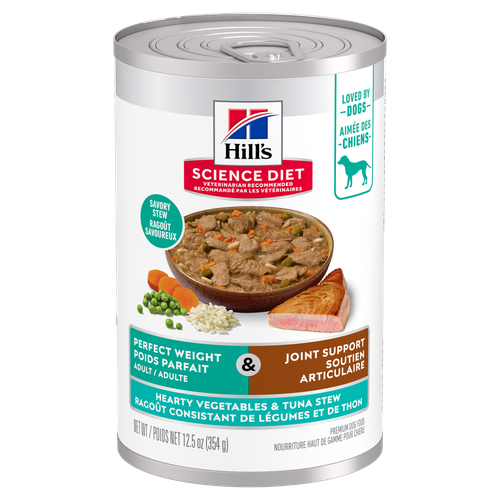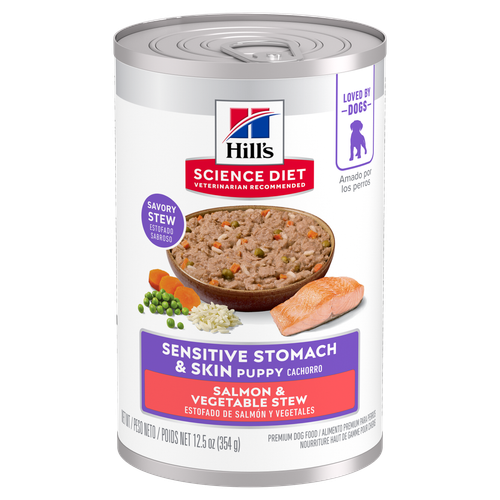
-
Find the right food for your petTake this quiz to see which food may be the best for your furry friend.Find the right food for your petTake this quiz to see which food may be the best for your furry friend.Featured products
 Adult Perfect Weight & Joint Support Hearty Vegetables and Tuna Stew Dog FoodShop Now
Adult Perfect Weight & Joint Support Hearty Vegetables and Tuna Stew Dog FoodShop Now Sensitive Stomach & Skin, assortiment de conserves
Sensitive Stomach & Skin, assortiment de conservesHill's Science Diet Sensitive Stomach & Skin Variety Pack
Shop Now Healthy Cuisine, Adulte, assortiment de conserves
Healthy Cuisine, Adulte, assortiment de conservesHill's Science Diet Healthy Cuisine Variety Pack
Shop NowFeatured products Adult 7+ Tender Chicken Dinner Cat Food
Adult 7+ Tender Chicken Dinner Cat FoodWith delicious chunks in a decadent gravy
Shop Now Perfect Weight Salmon & Vegetable Canned Cat Food
Perfect Weight Salmon & Vegetable Canned Cat FoodOver 70% of cats lost weight within 10 weeks when fed this nutrition
Shop Now Adult Chicken & Spinach Casserole Cat Food
Adult Chicken & Spinach Casserole Cat FoodWith delicious chunks in a decadent gravy
Shop Now -
Dog
- Dog Tips & Articles
-
Health Category
- Weight
- Food & Environmental Sensitivities
- Urinary
- Digestive
- Joint
- Kidney
- Dental
- Cancer
-
Life Stage
- Puppy Nutrition
- Adult Nutrition
- Senior Nutrition
Cat- Cat Tips & Articles
-
Health Category
- Weight
- Skin & Food Sensitivities
- Urinary
- Digestive
- Kidney
- Dental
- Stress
- Cancer
-
Life Stage
- Kitten Nutrition
- Adult Nutrition
Featured articles Pet Food Storage Tips
Pet Food Storage TipsDiscover how and where to store your dry, as well as canned, dog and cat food. Learn how to find the "best before" dates on all Hill's pet food packaging.
Read More The Incredible Science Behind Your Pet's Microbiome
The Incredible Science Behind Your Pet's MicrobiomeLearn what a pet's microbiome is, how it contributes to your pet's gut & overall health, and why nutrition is important in maintaining healthy microbiomes.
Read More Compare Your Pet Food's Calories to Other Brands
Compare Your Pet Food's Calories to Other BrandsCompare Hill's Science Diet dog and cat food's calories against other pet food brands and AAFCO recommended maximum calorie count.
Read More -


Everyone has laughed at internet photos of shamefaced dogs alongside evidence of their naughty deeds. There's no doubt that dogs are good at looking guilty, but is guilt or shame an emotion they actually experience? If your guilty dog is truly ashamed of his bad behavior, why does he turn around and do it again at the next given opportunity? Read on to see if dog shaming really means anything to your dog.
Do Dogs Feel Shame?

While there's little doubt that dogs are capable of feeling primary emotions, which include feelings such as happiness, sadness and fear, there's far less evidence that dogs experience what are called secondary emotions, which include guilt and shame, says Scientific American. Secondary emotions are much more complex, and researchers surmise that dogs simply don't have the cognitive ability to process such complicated feelings.
Learned Behavior
The truth is, while there is no scientific evidence that dogs actually feel guilt or shame, there is also no proof that they don't. That said, PBS News Hour reports that some studies, such as one conducted by New York City's Barnard College associate professor of psychology Alexandra Horowitz, suggest that the guilty look dogs give when they're caught in the act is a learned response to human reactions. In the study, dogs acted guilty when scolded by their owners, regardless of whether they had actually committed the act for which they were being scolded. Based on this, it seems likely that dogs learn quickly that when pet parents unhappy with them, they can placate their humans by looking sad.
Another experiment conducted by Eötvös Loránd University in Budapest, which appeared in the journal Applied Animal Behavior Science, corroborated these findings. The experiment was designed to answer two questions: would "guilty dogs" who had misbehaved greet their owners differently from those who had not misbehaved, and could owners accurately determine by the way they were greeted whether their dogs had done something wrong? The study found that not only were dog parents unable to accurately tell whether their dogs had messed up, but as with the other study, both guilty and innocent dogs acted ashamed only when their owners assumed they had misbehaved and spoke to their dogs accordingly.
Does Dog Shaming Work?
Maybe your dog doesn't feel actual guilt over his transgressions, but it's clear that he can tell when you're unhappy with him. The problem is, your dog often has no idea why you're angry, The Telegraph reports. Dogs can't be shamed into avoiding bad behavior when they have no understanding of which thing they did was bad. Reprimanding your dog only works if you can do it either while he's committing the act or immediately after so that he makes the association between his behavior and the consequence, reports USA Today.


Tasty Tips
Can Dog Shaming Harm Your Dog?

The dog shaming trend may do more harm than good. The concern is that what's being interpreted as a guilty look is actually a sign of anxiety or fear, and that shaming or scolding your dog will only add to his stress. There's also the possibility that many of the behaviors for which dogs appear on dog shaming sites, such as destructive chewing or relieving themselves inappropriately, might be signs of an anxiety disorder or an underlying health issue, such as a urinary tract infection. While it seems unlikely that your dog will be harmed by having a picture of his guilty look posted on the internet for fun, it's a good idea to discuss his unwanted behavior with your veterinarian, especially if it's out of the ordinary or if it becomes a chronic problem.
Ultimately, it's important to keep in mind that scolding or shaming your dog too long after the fact will only serve to make you feel better. It won't make your dog feel bad about his actions — he'll only be sad that you're upset. So, if you find yourself coming home to torn up pillows or puddles on your floor it is best to think about training your dog some more. If the actions continue, you may have to consult your vet for a health check or a dog behaviorist for better training instruction. Dogs are pack animals, and they see you as their pack leader. They want to make you happy, not angry, so just remember that their bad behavior is not intentional or directed toward you. Keep calm and be sure to reward his positive actions, rather than disciplining him for bad behavior. In time, he can start to understand, and you can start to build an even stronger relationship with your pup.


Jean Marie Bauhaus is a pet parent, pet blogger, and novelist from Tulsa, Oklahoma, where she usually writes under the supervision of a lapful of fur babies.
Related products


Hill's Science Diet Sensitive Stomach & Skin Variety Pack

Hill's Science Diet Healthy Cuisine Variety Pack

Gentle on stomachs while nourishing skin & supporting development in growing puppies
Related articles

Discover fun and engaging games and other ways to help your dog exercise, keeping him happy and healthy.

Proper nutrition for your pregnant or nursing dog is vital to her and her puppy's health. Learn what you should do provide her with the proper nutrients.

Learn how to stop your dog from begging at the dinner table, and understand how it can help contribute to his health.

Gather the following puppy supplies to prepare your family for all the fun (and commitment) that comes with being a dog parent.

Put your dog on a diet without them knowing
Our low calorie formula helps you control your dog's weight. It's packed with high-quality protein for building lean muscles, and made with purposeful ingredients for a flavorful, nutritious meal. Clinically proven antioxidants, Vitamin C+E, help promote a healthy immune system.
Put your dog on a diet without them knowing
Our low calorie formula helps you control your dog's weight. It's packed with high-quality protein for building lean muscles, and made with purposeful ingredients for a flavorful, nutritious meal. Clinically proven antioxidants, Vitamin C+E, help promote a healthy immune system.

